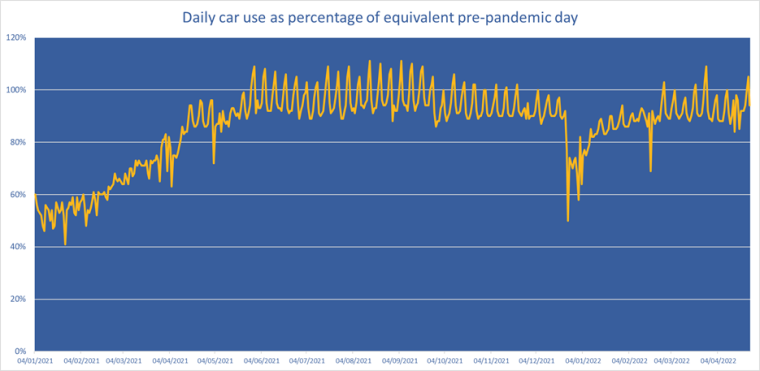Cost of Living Crisis Affects Seven in Ten Drivers
Kwik Fit | Thursday 5th May 2022 9:15AM
- Over one third of drivers have cut down on car journeys since beginning of the year
- One in five focusing on a smooth driving style
- 17% of EV and hybrid drivers have switched from petrol or diesel in 2022 due to spike in costs
The cost of living crisis is affecting the vast majority of drivers’ motoring habits, with research published today showing that seven in ten (69%) motorists have changed their behaviour since the beginning of the year.1
New research for Kwik Fit, the UK’s leading automotive servicing and repair company, reveals that in 2022 over one third (35%) of drivers have cut down on car journeys they describe as “non-essential”. Those driving petrol or diesel cars are twice as likely to have cut down on these journeys compared to drivers of electric vehicles (EVs) or hybrids (40% vs 22% respectively).
The cost of living crisis has prompted many drivers to reappraise their driving styles – more than one in five drivers (21%) say they have consciously tried to drive more smoothly or less aggressively. 14% say they have driven more slowly on all their journeys, with 17% saying they have done so on some journeys. Despite the average low emission car (EV or hybrid) being less costly to run, drivers of these vehicles are more likely to have decreased their speed than those driving petrol or diesel engine cars.
The Kwik Fit research found that 17% of drivers of EVs or hybrids have swapped from a diesel or petrol car this year as a direct result of the cost of living crisis. Some car owners have made an even more dramatic switch - 4% of drivers say they have sold their car this year and not replaced it. The research findings highlight that the impact of rising costs is not uniform across different groups – drivers under 35 are a staggering eight times more likely to have sold their car and not replaced it than drivers over 55.
One in ten London drivers say they have sold their car and not replaced it. This may be due to the availability of public transport options as an alternative to private car journeys as 14% of drivers in the capital say they have made more of their essential journeys by public transport or have car shared. This is the highest figure of all UK regions and compares to only 4% in the more rural areas of the South West and East of England, the regions with the lowest number of drivers switching to public transport.
Although the government may be keen to reverse the home working revolution caused by the pandemic and get people back to the office, Kwik Fit’s research shows that the cost of living crisis may not help in their aim. 11% of drivers say that since January they have been working from home even more often in order to save money on driving costs.
The increasing cost of motoring has prompted some drivers to take up good motoring maintenance habits. One in ten drivers (10%) say they have started regularly checking their tyre pressures, while a slightly higher proportion (11%) have emptied their car boot of any heavy items. 3% of drivers say they have removed roof racks, bars or bike racks which they normally keep permanently on their car. (8% of drivers under 35 say they have done this.)
These research findings for Kwik Fit tie in with official government data on car use2. This shows that in 2021 car traffic returned towards the same levels as the equivalent days before the pandemic and by June 2021 was regularly exceeding those figures (see chart below). However, since January 2022, daily car usage has exceeded the equivalent pre-pandemic volume on only five occasions.

Roger Griggs, communications director at Kwik Fit, says: “The cost of living crisis is impacting many areas of our lives and motoring is no exception. While some drivers are able to cut down on their journeys, many of the journeys motorists make are essential and cannot be made by other means. We would encourage all motorists to make sure their car is running as efficiently as possible and to especially take the measures that cost nothing – ensure that their tyres are at the correct pressure and that the car is not suffering from unnecessary weight in the boot or drag on the roof. Seemingly small measures can have a big impact on fuel consumption and of course, having the correct tyre pressure will also help prolong the life of a tyre by reducing premature wear.”
Drivers can check the correct pressure for their tyres on the Kwik-Fit website and if they have any concerns can book in for a free tyre inspection. For the latest news and updates from Kwik Fit, customers can also follow the company on Twitter at @kwik_fit.
Note to editors
Sources:
- Research carried out by Opinium among a nationally representative sample of 2000 UK adults – fieldwork 26-29 April 2022
- DfT data on transport use during the pandemic, published 27 April 2022
About Kwik Fit
Established in 1971, the Kwik Fit Group is one of the largest independent automotive parts, repair and replacement specialists in the world. Kwik Fit has over 600 service centres across the UK and more than 200 mobile tyre fitting vehicles, making it the UK’s leading tyre, exhaust, brake and MoT specialist. Details of its range of products and services can be found at kwik-fit.com